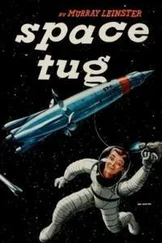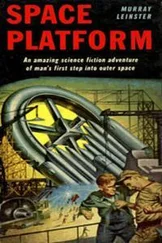There was no debris about. There was no cargo waiting to be loaded. Cochrane did see a great metal plate, tilted on the ground, with a large box attached to it by cables. That would be the generators and the field–plate for a Dabney field. It was plainly to remain on the moon. It was not underneath the ship. Cochrane puzzled tiredly over it for a moment. Then he understood. The ship would lift on its rockets, hover over the plate—which would be generating its half of the field—and then Jones would switch on the apparatus in the ship itself. The forward, needle–pointed nose of the ship would become another generator of the Dabney field. The ship's inertia, in that field, would be effectively reduced to a fraction of its former value. The rockets, which might give it an acceleration of a few hundred feet per second anywhere but in a Dabney field, would immediately accelerate the ship and all its contents to an otherwise unattainable velocity. The occupants of the rocket would lose their relative inertia to the same degree as the ship. They should feel no more acceleration than from the same rocket–thrust in normal space. But they would travel—
Cochrane felt that there was a fallacy somehow, in the working of the Dabney field as he understood it. If there was less inertia in the Dabney field—why—a rocket shouldn't push as hard in it, because, it was the inertia of the rocket–gases that gave the rocket–thrust. But Cochrane was much too tired to work out a theoretic objection to something he knew did work. He was almost dozing when Babs touched his arm.
"Space–suits, Mr. Cochrane."
He got wearily into the clumsy costume. But he saw again that Babs wore the shining–eyed look of rapturous adventure that he had seen her wear before.
They got out of the moon–jeep, one after the other. The sling came down the space–ship's gleaming side. They got in it, together. It lifted them.
The vast, polished hull of the space–ship slid past them only ten feet away. The ground diminished. They seemed less to be lifted than to float skyward. And in this sling, in this completely unreal ascent, Cochrane roused suddenly. He felt the acute unease which comes of height. He had looked down upon Earth from a height of four thousand miles with no feeling of dizziness. He had looked at Earth a quarter–million miles away with no consciousness of depth. But a mere fifty feet above the surface of the moon he felt like somebody swinging out of a skyscraper window.
Then the airlock opening was beside them, and the sling rolled inward. They were in the lock, and Cochrane found himself pushing Babs away from the unrailed opening. He was relieved when the airlock closed.
Inside the ship, with the space–suits off, there was light and warmth, and a remarkably matter–of–fact atmosphere. The ship had been built to sell stock in a scheme for colonizing Mars. Prospective investors had been shown through it. It had been designed to be a convincing passenger–liner of space.
It was. But Cochrane found himself not needed for any consultation, and Jones was busy, and Bill Holden highly preoccupied. He saw Alicia Keith—but her name was Simms now. She smiled at him but took Babs by the arm. They went off somewhere.
Cochrane waited for somebody to tell him what to look at and to admire. He saw Jamison, and Bell, and he saw a man he had not seen before. He settled down in a deeply upholstered chair. He felt neglected. Everybody was busy. But mostly he felt tired.
He slept.
Then Babs was shaking his arm, her eyes shining.
"Mr. Cochrane!" she cried urgently. "Mr. Cochrane! Wake up! Go on up to the control–room! We're going to take off!"
He blinked at her.
"We!" Then he started up, and went five feet into the air from the violence of his uncalculated movement. "We? No you don't! You go back to Lunar City where you'll be safe!"
Then he heard a peculiar drumming, rumbling noise. He had heard it before. In the moonship. It was rockets being tested; being burned; rockets in the very last seconds of preparation before take–off for the stars.
He didn't drop back to the floor beside the chair he'd occupied. The floor rose to meet him.
"I've had our baggage brought on board," said Babs, happily. "I'm going because I'm a stockholder! Hold on to something and climb those stairs if you want to see us go up! I'm going to be busy!"
The physical sensations of ascending to the ship's control–room were weird in the extreme. Cochrane had just been wakened from a worn–out sleep, and it was always startling on the moon to wake and find one's self weighing one–sixth of normal. It took seconds to remember how one got that way. But on the way up the stairs, Cochrane was further confused by the fact that the ship was surging this way and swaying that. It moved above the moon's surface to get over the tilted flat Dabney field plate on the ground a hundred yards from the ship's original position.
The Dabney field, obviously, was not in being. The ship hovered on its rockets. They had been designed to lift it off of Earth—and they had—against six times the effective gravity here, and with an acceleration of more gravities on top of that. So the ship rose lightly, almost skittishly. When gyros turned to make it drift sidewise—as a helicopter tilts in Earth's atmosphere—it fairly swooped to a new position. Somebody jockeyed it this way and that.
Cochrane got to the control–room by holding on with both hands to railings. He was angry and appalled.
The control–room was a hemisphere, with vertical vision–screens picturing the stars overhead. Jones stood in an odd sort of harness beside a set of control–switches that did not match the smoothly designed other controls of the ship. He looked out of a plastic blister, by which he could see around and below the ship. He made urgent signals to a man Cochrane had never seen before, who sat in a strap–chair before many other complex controls with his hands playing back and forth upon them. A loudspeaker blatted unmusically. It was Dabney's voice, highly agitated and uneasy.
" … my work for the advancement of science has been applied by other minds. I need to specify that if the experiment now about to begin does not succeed, it will not invalidate my discovery, which has been amply verified by other means. It may be, indeed, that my discovery is so far ahead of present engineering—. "
"See here!" raged Cochrane. "You can't take off with Babs on board! This is dangerous!"
Nobody paid any attention. Jones made frantic gestures to indicate the most delicate of adjustments. The man in the strap–chair obeyed the instruction with an absorbed attention. Jones suddenly threw a switch. Something lighted, somewhere. There was a momentary throbbing sound which was not quite a sound.
"Take it away," said Jones in a flat voice.
The man in the strap–chair pressed hard on the controls. Cochrane glanced desperately out of one of the side ports. He saw the moonscape—the frozen lava sea with its layer of whitish–tan moondust. He saw many moon–jeeps gathered near, as if most of the population of Lunar City had been gathered to watch this event. He saw the extraordinary nearness of the moon's horizon.
But it was the most momentary of glimpses. As he opened his mouth to roar a protest, he felt the upward, curiously comforting thrust of acceleration to one full Earth–gravity.
The moonscape was snatched away from beneath the ship. It did not descend. The ship did not seem to rise. The moon itself diminished and vanished like a pricked bubble. The speed of its disappearance was not—it specifically was not—attributable to one earth–gravity of lift applied on a one–sixth–gravity moon.
The loudspeaker hiccoughed and was silent. Cochrane uttered the roar he had started before the added acceleration began. But it was useless. Out the side–port, he saw the stars. They were not still and changeless and winking, as they appeared from the moon. These stars seemed to stir uneasily, to shift ever so slightly among themselves, like flecks of bright color drifting on a breeze.
Читать дальше






